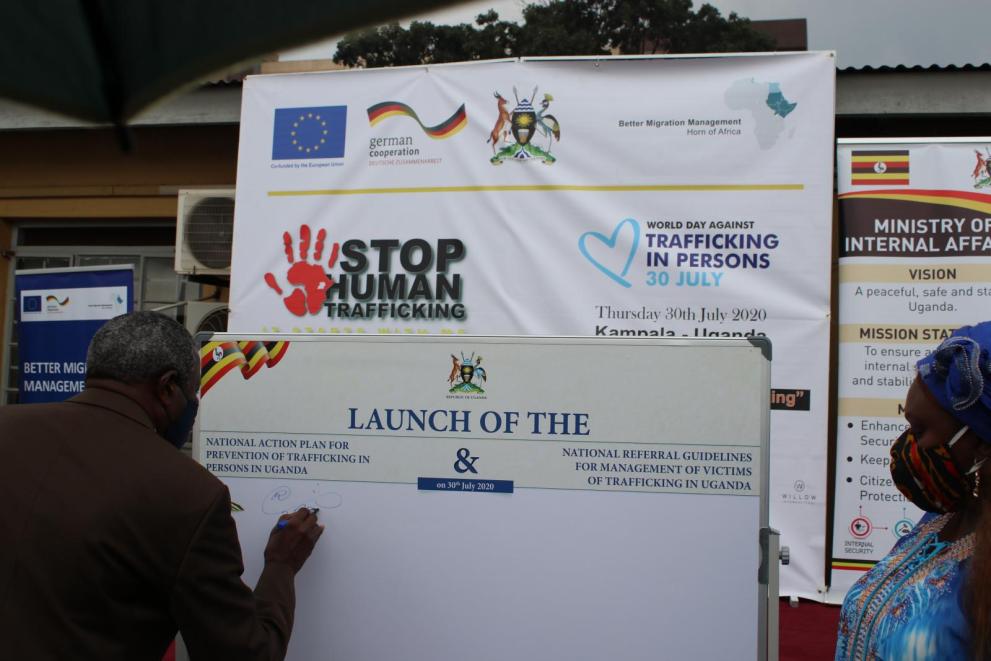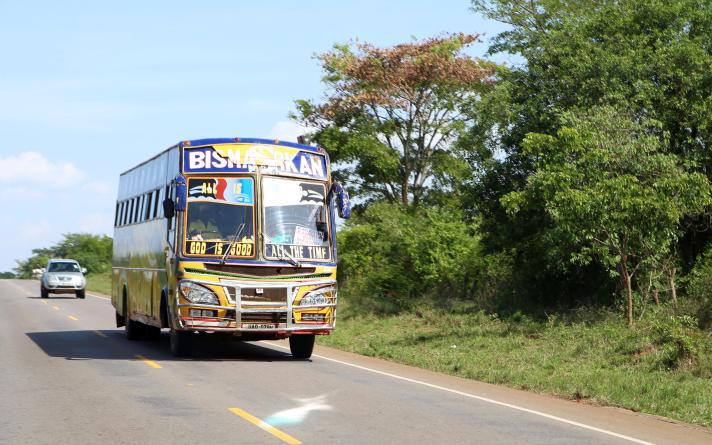
‘Ugandans are increasingly trafficked for commercial sex or labour exploitation in countries such as Kenya, Oman, Saudi Arabia and the United Arab Emirates,’ the U.S. Department of State’s Trafficking in Persons 2021 Report has revealed. Among these victims are many children, such as the 35 trafficked girls aged 12–17 years from the Karamoja region who were found in Kenya and voluntarily returned to Uganda in August 2021.
Coordination amongst stakeholders is key to counter human trafficking
Uganda has taken steps to counter human trafficking, including the ratification of the United Nations Convention against Transnational Organized Crime in 2005 and the enactment of its Prevention of Trafficking in Persons Act in 2009, which has served as a model for other countries. The country’s National Action Plan for Prevention of Trafficking in Persons, launched in 2020, indicates that successful implementation requires coordination at various stages and levels, dealing with the rescue and identification of victims, their protection, the investigation and prosecution of criminals as well as general preventive measures against the crime.
The Coordination Office for Prevention of Trafficking in Persons (COPTIP) under the Ministry of Internal Affairs coordinates all measures mandated in the National Action Plan. ‘Our partnership efforts focus on ensuring that the tasks of stakeholders and counterparts at the national level, in districts and across national borders are streamlined,’ declares Agnes Igoye, the Deputy Coordinator. COPTIP also provides training for its member institutions such as the specialised law enforcement units, information and data as well assupport for policy improvements to effectively counter and prevent human trafficking..
She is convinced that they ’all collectively share the responsibility to assure the people who seek justice that the institutions, processes and laws in Uganda are meant to work in their best interest.’
High impact through awareness raising
In addition, COPTIP runs community awareness campaigns ‘because awareness-building about human trafficking greatly impacts the outcomes’, Igoye says. She explains that ‘many girls are forced by their parents to go and work after seeing some of their peers returning with basic items like saucepans, new mattresses, a phone or other things. That is how many ended up in Kenya.’ According to her, Ugandan girls are often found on the streets and in markets and restaurants in Kenya, and many are being sexually exploited.
Damon Wamara, Executive Director of the Uganda Child Rights NGO Network, a network of civil society organisations advocating for the safety and protection of children against all forms of violence and abuse, knows about the importance of raising awareness. ‘Uganda faces a big problem nested in our local communities. People in our local communities don’t even know that they aid human trafficking. Due to amplified harsh social economic conditions, triggered by the outbreak of COVID-19, we already see rising cases of parents who are pushing their children into domestic slavery, a surge of early child marriages and teenage pregnancies, especially in rural areas outside the capital city, and an increase in domestic violence, child neglect and all forms of exploitation.’
COPTIP engages local leaders and elders at community level
COPTIP is investing in communities to suppress traditional activities that promote human trafficking and other forms of abuse such as child marriage or seeing a girl as a source of income in relation to dowry, sexual exploitation or kidnapping for marriage. ‘In the Napak district in the Karamoja region, we actively engage local leaders and elders to collectively address poverty, the absence of parental care and a weak social safety mechanism as community triggers that push children to the streets,’ Igoye says.
One of the measures taken to prevent trafficking of minors for instance is that bus drivers in Karamoja are no longer allowed to pick up minors and young people except in designated areas that have security surveillance. Moses Binoga, Commissioner of Police and former Coordinator of COPTIP, explains that such measures ‘help to boost transnational efforts to trace and rescue victims of trafficking’.
Background
The Better Migration Management (BMM) programme is funded by the EU Trust Fund for Africa and the German Federal Ministry for Economic Cooperation and Development. Its objective is to improve the management of safe, orderly and regular migration in the region and support national authorities in addressing the smuggling of migrants and trafficking in human beings within and from the Horn of Africa.
In Uganda, BMM acts in partnership with the COPTIP Task Force and with its member Ministries. It supported the development and implementation of the National Action Plan. COPTIP representatives also received training and equipment to strengthen their coordination capacity, including a national database on human trafficking cases, to enhance measures designed to identify and protect vulnerable migrants and refer them to the relevant services. BMM is also supporting COPTIP to raise awareness on human trafficking and provide information about safe and legal migration.
Details
- Publication date
- 25 March 2022
- Region and Country
- Horn of Africa
- Uganda
- Thematic
- Improved migration management
- Partner
- GIZ

